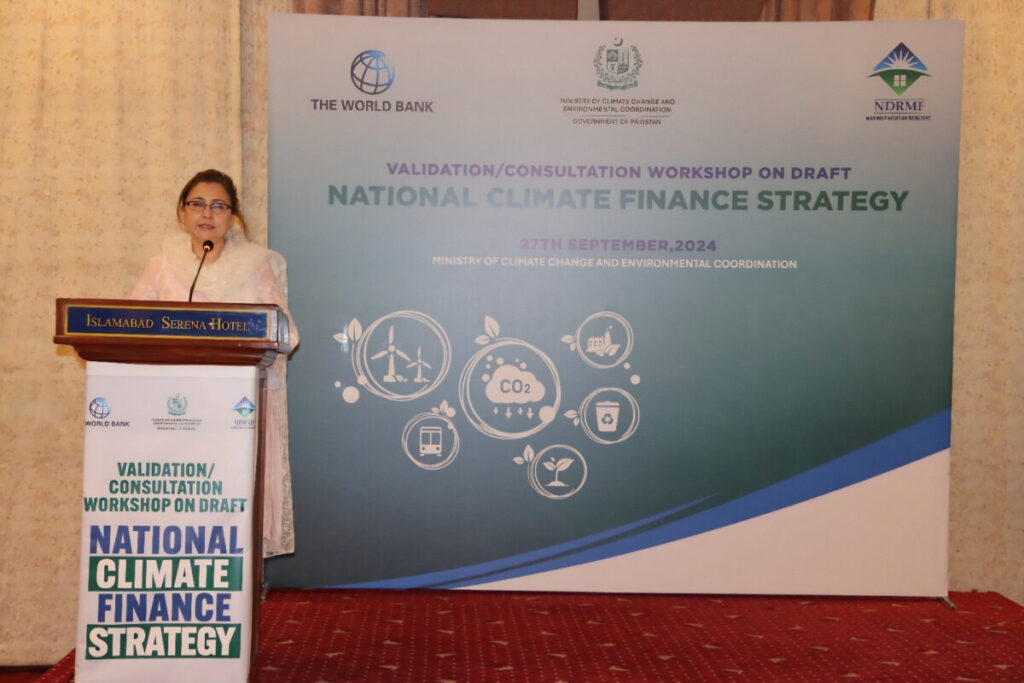Islamabad, Sep 27: The Ministry of Climate Change and Environmental Coordination, in collaboration with key stakeholders, convened a high-level consultation workshop on the National Climate Finance Strategy today in Islamabad. The workshop brought together officers from key Federal Ministries of MoCC, Finance, Planning, Economic Affairs, Energy, Industries, Commerce, Food & Agriculture, representatives of provincial Governments of Punjab, KP,GB, Balochistan, Sindh and AJK, international development partners, financial institutions, and civil society organizations to discuss pathways for strengthening Pakistan’s climate finance mechanisms.
The National Climate Finance Strategy, a vital component of Pakistan’s commitment to climate action under the Paris Agreement, aims to enhance the country’s ability to mobilize, allocate, and manage financial resources for climate resilience and low-carbon development. With Pakistan facing increasing climate risks, including floods, droughts, and rising temperatures, the strategy is designed to support the nation’s transition to a sustainable and climate-resilient future.
Key objectives of the workshop included:
– Stakeholder Engagement: Gather input and recommendations from a wide range of stakeholders to ensure a comprehensive and inclusive approach to climate finance.
– Resource Mobilization: Identify opportunities for scaling up domestic and international climate finance resources, including private sector investments, to meet Pakistan’s climate mitigation and adaptation goals.
– Capacity Building: Strengthen institutional capacities for climate finance planning and execution at both national and sub-national levels.
– International Collaboration: Align Pakistan’s climate finance efforts with global climate finance frameworks and facilitate collaboration with multilateral financial institutions and international partners.
In his opening remarks, Secretary Ministry of Climate Change, Ms. Ayesha Humera Ch. emphasized the importance of strategic financial planning for climate resilience. “Pakistan is on the frontlines of climate change. We must ensure that the financial resources are in place to protect our most vulnerable communities while contributing to global climate targets. The National Climate Finance Strategy will provide a roadmap to secure and deploy the necessary resources effectively.”
The workshop included presentations and discussions on the following topics:
– Climate finance landscape by CEO NDRMF, Mr. Bilal Anwer
– salient features of draft Climate Finance Strategy by Dr. Ali Tauqir Shaikh.
Afterwards technical working group session was held on the following three broad areas:
Working Group One: Exploring Avenues of Climate Finance Diversification
Coordinator: Mr. Mohammad Rafiq Sahib Member Climate Finance , Pakistan Climate Change Authority
Working Group Two : Improving Climate Finance Governance for Role out of NCFS
Coordinator: Syed Gulam Qadir Member Coordination, Pakistan Climate Change Authority
Working Group Three: leveraging Private Sector Finance for Climate Action
Coordinator: Mr. Saadullah Ayaz sahib Member Mitigation, Pakistan Climate Change Authority
Other Key stakeholders present at the event included representatives fromthe Pakistan Environmental Protection Agency (Pak-EPA), the State Bank of Pakistan, SECP, international organizations such as the United Nations Development Programme (UNDP), the World Bank, GIZ, and climate finance experts from academia and the private sector.
Participants actively contributed to the discussions, providing insights into policy gaps, financing challenges, and opportunities for leveraging private sector investments. The recommendations from the workshop will be integrated into the final draft of the National Climate Finance Strategy, which will be submitted for government approval later this year.
Several participants also participated the workshop through Zoom.The Ministry of Climate Change reiterated its commitment to pursuing sustainable development goals, and this workshop marks a crucial step toward achieving Pakistan’s climate objectives by ensuring financial readiness for future climate action.
Mr. Zafar Masood, Chairman Pakistan Banks Association and President Bank of Punjab while concluding the workshop praised the efforts of Ministry of Climate Change. He said that The National Climate Finance Strategy is Pakistan’s blueprint for mobilizing financial resources to support climate mitigation and adaptation efforts.
It outlines measures to scale up climate-related investments, attract international finance, and strengthen domestic financial systems to address the country’s climate challenges.The workshop ended with a vote of thanks from the Ministry to the participants.
